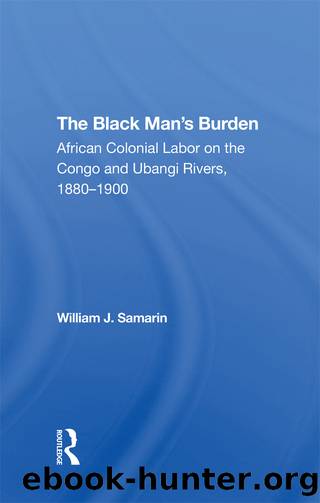The Black Man's Burden: African Colonial Labor on the Congo and Ubangi Rivers, 18801900 by William J Samarin

Author:William J Samarin [Samarin, William J]
Language: eng
Format: epub
ISBN: 9780367290382
Google: fxjeyQEACAAJ
Goodreads: 52056157
Publisher: Routledge
Published: 2019-09-13T00:00:00+00:00
Summary
Whenever whites travelled over land, they needed porters. There was no other way for them to transport all of their personal belongings, trade items, and military equipment. The few soldiers they brought with them were far from adequate, and indigenous people had to be recruited for this task. The first place porters were needed was in that part of the Lower Congo where the cataracts prevented the use of the Congo River by boat, a distance of about 250 mi. by one of the routes over hilly and difficult terrain. Until the railroad was completed in 1898 everything was carried by men, adolescents, and children. Since the waterways above Stanley Pool were being explored and exploited, all of the massive parts of the steamboats also had to be transported by human beings. Moreover, since the colonization of central Africa had to pay for itselfâand moreâall kinds of goods (mostly ivory to begin with) had to be carried southward over this same route. Without these porters the occupation of central Africa would not have been possible at all. The numbers increased, naturally, as more and more of the land and people came under white control. In 1892 about 40,000 men were used as porters, and in the period 1887-1898 there had been at least 2,730,533 manloads in the Lower Congo.
In Belgian territory the State controlled the hiring of porters as well as of all workers. Porters were sometimes paid for their services (usually only enough to buy their food while in the caravans), but throughout the period with which we are concerned (and even into the twentieth century) porters were recruited by levies and forced into service whenever necessary by taking women and children as hostages. Slaves were also used as carriers. In response to white exactions (and oppression by their black soldiers) the people of the Lower Congo from time to time refused to cooperate, behavior that brought upon them terrible retribution. Such exactions were not limited to the State in the Lower Congo. The French, occupying the hinterlands of the Ubangi basin, where rivers could not serve them, obliged indigenous peoples by the thousands to work intensively. Here as elsewhere in porterage, caravans resembled those of the slave trade that whites were suppressing.
Whereas the people of the Upper Congo, the Bangala, were entering the work force in a variety of ways, the Bakongo, who inhabited the Lower Congo, were restricted almost entirely to porterage. Treated like slaves, they did not develop a new sense of identity as did the Bangala. The only Africans who profited from this kind of labor were the soldiers who accompanied the caravans and the kapitas who were responsible for getting the loads to their destinations.
Leaving land transport in this chapter, we take up in the next that of water transport. Steamboats needed workers of many different sorts. When rivers were not deep enough for these boats or rapids obstructed passage, canoes had to be used. This was the case on the Ubangi River, shared as a communication system by both the Belgians and the French.
Download
This site does not store any files on its server. We only index and link to content provided by other sites. Please contact the content providers to delete copyright contents if any and email us, we'll remove relevant links or contents immediately.
Cecilia; Or, Memoirs of an Heiress — Volume 1 by Fanny Burney(32548)
Cecilia; Or, Memoirs of an Heiress — Volume 2 by Fanny Burney(31947)
Cecilia; Or, Memoirs of an Heiress — Volume 3 by Fanny Burney(31932)
The Great Music City by Andrea Baker(31917)
We're Going to Need More Wine by Gabrielle Union(19034)
All the Missing Girls by Megan Miranda(15959)
Pimp by Iceberg Slim(14488)
Bombshells: Glamour Girls of a Lifetime by Sullivan Steve(14057)
For the Love of Europe by Rick Steves(13915)
Talking to Strangers by Malcolm Gladwell(13350)
Norse Mythology by Gaiman Neil(13349)
Fifty Shades Freed by E L James(13233)
Mindhunter: Inside the FBI's Elite Serial Crime Unit by John E. Douglas & Mark Olshaker(9324)
Crazy Rich Asians by Kevin Kwan(9279)
The Lost Art of Listening by Michael P. Nichols(7494)
Enlightenment Now: The Case for Reason, Science, Humanism, and Progress by Steven Pinker(7306)
The Four Agreements by Don Miguel Ruiz(6745)
Bad Blood by John Carreyrou(6611)
Weapons of Math Destruction by Cathy O'Neil(6266)
